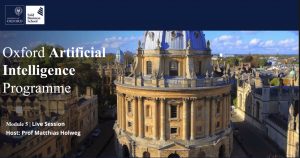
As some of you will know, I have just finished a course at Saïd Business School, Oxford on AI. It was a fascinating few months of study, where I ruminated not only on the nature of intelligence but also on the specifics of AI and how it should be deployed (both physically and ethically). I built a recommendation engine, a chatbot, trained and optimised a neural network, wrote ethical guidelines and business cases. Quite a whirlwind tour!
What did I learn?
Data is everything – both in terms of quantity and quality. This has two main implications – the age old problem of businesses having rubbish data does not immediately get fixed by AI – and the benefits of having reliable data is even higher. Secondly, Data in the quantities required to train ever more complex neural networks and algorithms increasingly lies in the hands of a few corporations.
Change is coming (No Shit!)– but the old rules still apply – we are overestimating the short term impact and underestimating the long term impact – as usual! The strong will get stronger (See the previous comment) and it will require far more than mere regulation to help us find a new balancing point between Capital and Labour (surplus or otherwise).
What is Artificial Intelligence? The Turing test was the traditional test of Artificial intelligence, but this is perhaps in need of updating. Emotional intelligence is still an area that AI struggles in – so perhaps we need a new test – perhaps if an AI can pass off as a Stand-Up comedian then they will have reached a new zenith in understanding how nuance, timing and emotional intelligence work (and then we should be really scared) .
The dawn of generative AI will change the content market. Duh! I think we have all realised this – but we are struggling to comprehend how it will change things. There is no doubt that the wall of content produced by AI will become more banal than before and great content will have to swim in a sea of ‘white noise’. The truth will it be ever harder to determine when it is so easy to create and disseminate alternative narratives. This might have been an unexpected effect on the newspaper industry who will increasingly be relied upon to be arbiters of truth and will be expected to be provided to provide inspiration and Zeitgeist (so perhaps their imminent demise was a bit premature!). This means the return to the ‘content portals’ not seen since the dawn of the Internet. For retailers and merchants, text and video content will no longer be a differentiator. Face to face will become the real differentiator, so to get customers we’ll all have to work even harder to get physically in front of the crowd.
The new Test – Human content and contact will be at a premium and this might actually help us define the new ‘Turing test’ and that is not ‘can a computer fool a human’ but ‘can a computer fool another computer that it is human’. As search algorithms adapt into the new AI reality, this test will become the key to success.
